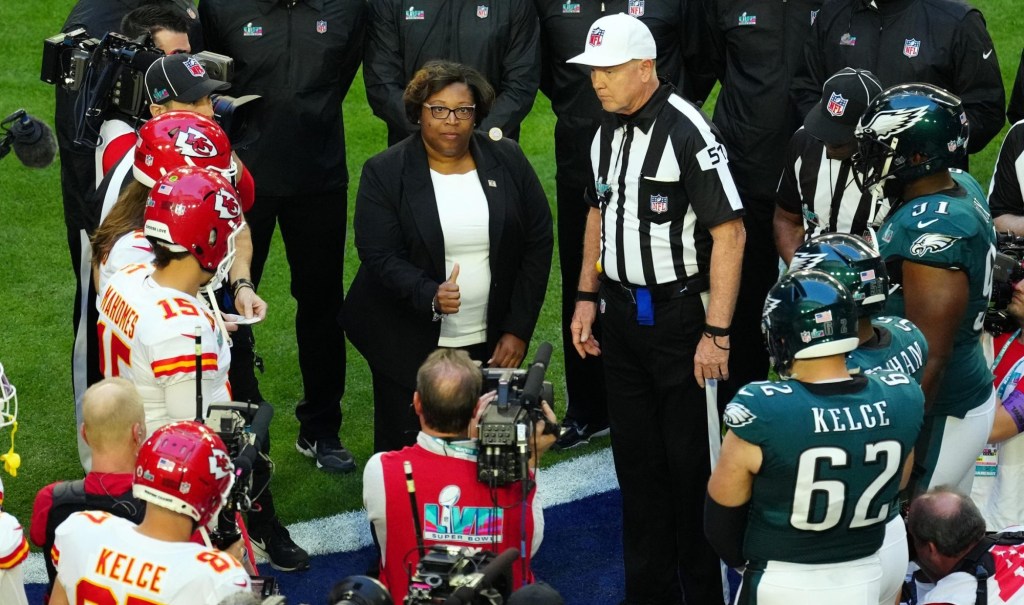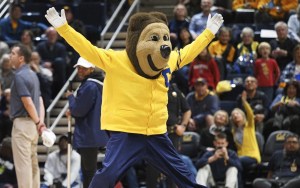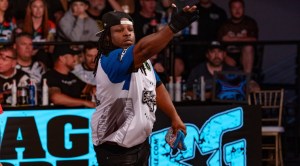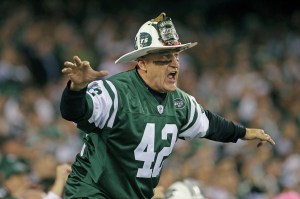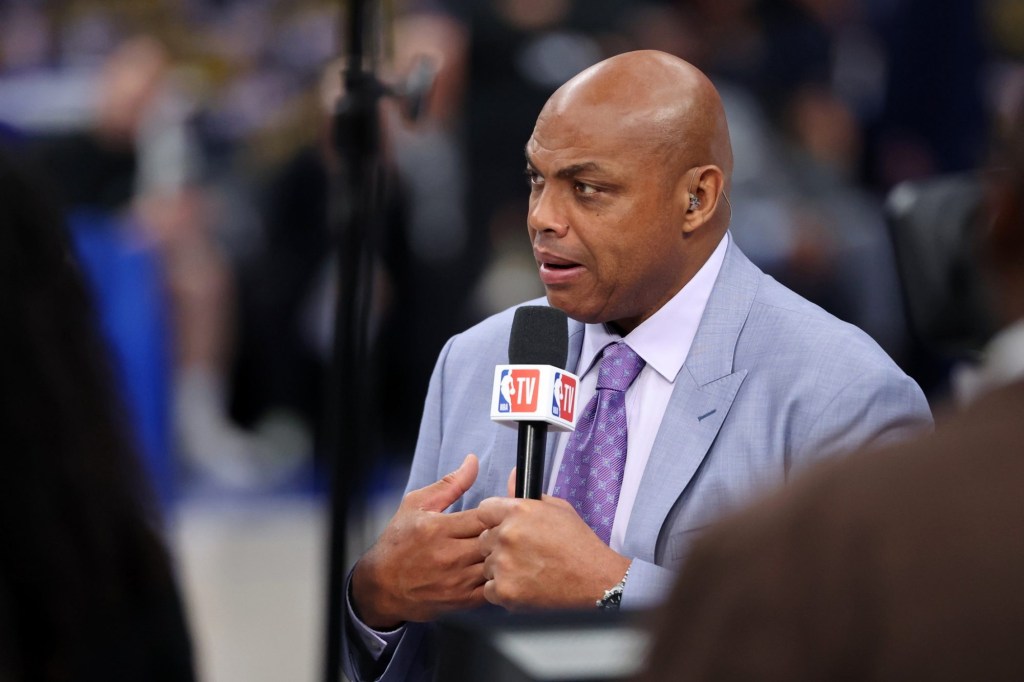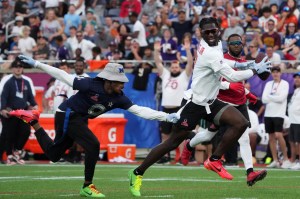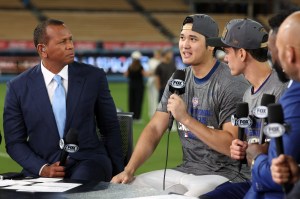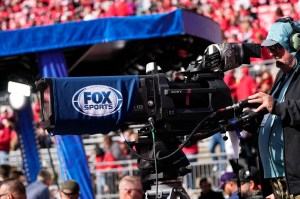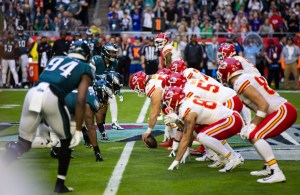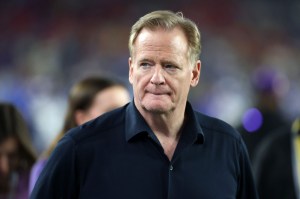On Nov. 1, CBS Sports’ Mark Grant and Kimani Morales made history as the likely first African-American producer and director duo to work an NFL game broadcast together.
In an interview with The Athletic, the pair reflected on the occasion and said they were hopeful that one day, people of color running a production would just be commonplace.
But 15 years ago, director Jonathan X and producer James Crittenden kicked off what’s now a long-running partnership on the first season of DirecTV’s NFL Red Zone channel, helping to create a mainstay of Sundays for football fans. Since then, the two have gone on to have decorated careers, also creating Strike Zone — the baseball version of Red Zone — and an esports version for Blizzard Entertainment.
X is multi-time Emmy winner as a freelancer, directing everything from the Oscar nominations to esports tournaments. Crittenden is now vice president of sports production and original content at AT&T.
Front Office Sports caught up with the pair to discuss their career paths, diversity in the industry, and advice for young professionals.
FOS: What led you both to end up working on Red Zone at that point in your careers?
James Crittenden: I started out as a salesman and sitting at home on Saturdays and Sundays watching sports, I kind of figured that’s my passion and I don’t want to be a salesman. So I just completely changed my career. And the first person I saw — African-American face I saw in a leadership position — in the control room was Jonathan. He was a technical director on Fox NFL Sunday.
Jonathan X: I was the start-up technical director for NFL on Fox for the first eight years and that’s where James and I first met.
JC: And I was a day hire just starting out in my career. And I kind of was just watching Jonathan and kind of gravitated to him — his style, his leadership qualities. And we started a friendship, and I don’t know what came over me a couple of years later, I said, ‘Jonathan, you’re going to be a director and I’m going to be the producer. We’re going to work together.’ Never knowing if that would possibly happen. And lo and behold, I would say probably about five years later, Red Zone came along and the rest as it is history. We started out on that show together. And as a director and producing combination, we’ve done many other shows and we’ve been together uninterrupted, or close to it— this is our 26 season being involved in, not working directly together on the same project. And since 2005, working on the same project, starting with Red Zone. And we started a new fantasy show called Fantasy Zone. And I asked Jonathan to move over because that was a really technically complex show, having a remote studio in New York and one in Los Angeles. And Jonathan was gracious enough to say, ‘Okay, I’ll go off the main show and help you develop this show as well.’ So Jonathan has been a true friend and a true partner in this journey.
FOS: How often are you working together nowadays?
JC: I’m kind of like the executive producer now. So most of my producers — and I would think Jonathan will share in this — are happy when I’m in my office, and away, and they get to do their jobs. I think that’s our relationship now. We’re lucky to have a good team and it’s essentially turnkey now. I just come in when there’s fires to be put out in regards to dealing with other operational things. But as far as the content and the production of the show, and the look and feel and development of the show, the producers and Jonathan being one of my directors, they have the large hand in doing that. From my perspective, it’s all about putting a good team together and giving them the tools to put on a good program.
JX: I came out to LA in 1987, before that I was in Washington. D.C, and I started off with a satellite news channel and then did the startup for Home Team Sports, which was one of the first regional sporting networks. And then from there I went to WRC, the NBC O&O. And then that was after the NABET strike of ‘87, I relocated to Los Angeles. I’ve been here in LA since 1987, working as a freelancer. And I would say about 18 years initially I was working as a technical director. Just doing Lakers, Clippers, Kings, Dodgers, Anaheim Angels.
JC: Don’t forget about the jumbo-tron!
JX: When I first came out here, it was difficult finding work, and I ended up going down to San Diego, doing diamond vision at Jack Murphy stadium, doing all the Aztecs, the Chargers, and the Padres games. So I went from working at NBC — a group seven technical director — to doing replays at Jack Murphy Stadium in San Diego. And that went on for a couple of years. And then one of the key things that happened, my engineer at Jack Murphy, Lorenzo Quick — and I’ll forever be appreciative of this — he was asking me what my goals were. And I said ‘I’m trying to break into the trucks.’ And just like that, he made a phone call to Liz Blackheart, who was the crewer at the time at National Mobile Television, which is one of the bigger truck companies out here on the West Coast. And then — I think I was making like 80 bucks a game during diamond vision — and then she offered me like $150 to do beach volleyball for Prime Ticket.
I said, ‘Oh, hell yeah. That’s like double what I’m making now.’ So I started working in the trucks. And then from there, it just accelerated. You go from one opportunity to the next, and you know, if a door opens up, you walk through and make the best of it. And then I got on the sports circuit. I was going ESPN, CBS football, all the primes ticket stuff — Lakers, Clippers, Kings, that whole route. And then one thing that I tell a lot of the younger people: where you go to school, where you graduate, every story is different. You make plans, but then again, you have to make sure you adapt and take advantage of the opportunities that are presented to you.
So once I started working in the trucks, started meeting up with people and started networking. I met a producer director named Mark Wolfson, and I did a good job for him, and next thing you know, I’m doing Dodgers with Vince Scully — did a couple years of Dodgers baseball. Then from there, I’m doing some other work. And I did a good job for another director and he offered me the Olympics. And I did my first Olympics — Winter Olympics in France, working with him. And then another person I met and did a good job, and he says, ‘Hey, are you interested in boxing?’ I started doing HBO boxing and all those pay-per-view fights. So it’s a journey, a path of networking, networking, networking. And then oddly enough, I’m working in San Diego and I’m filling in for TD, and I meet Bob Levy, and I was ready to go on lunch break, but he was from New York, and at the time our graphics operator was from New York, and he didn’t have a graphics package. So they said ‘come on, let’s stay.’ So I forfeited my meal break. I stayed on my meal break and we’re building all these graphics and building all these effects cause he had nothing. And I guess he appreciated that and enjoyed the creativity. Next thing you know, I get a call from him, ‘Hey, I’m starting up NFL on Fox. Would you like to be the TD? ‘And I was like, ‘sure.’ And so that’s how I ended up at NFL on Fox, because of a chance gig with somebody, and he needed help, and you get that extra effort and to say, ‘Okay, let’s stay through our lunch break and build stuff because he has no graphics package.’ And the guy remembered that creativity and then offered me the opportunity. So I mean, it’s just a matter of circumstance and situations and networking, because I went to Wichita State University, which is not the powerhouse of broadcasting, but just followed opportunities and doors and here I am now.
FOS: What was your dynamic like during a Red Zone telecast?
JC: Well, when we first started … it was Fox games only. So the dynamic was a little bit different. We didn’t really have a quote unquote traditional studio. We had a green screen and a single desk, and our biggest camera move — I’m stepping into your world, Jonathan, excuse me — is just one quick move in. That’s all we did, all day. That’s all that we had — one camera. That’s how it started. And the challenge there was, we couldn’t judge when they were going to break. So that was one of the fun things. Like, ‘Are they at break? Well, there’s no one talking, let’s go to the next game.’ I mean, it was just trial by error. It was something that had never been done before. And Jonathan and I took the approach that it’s kind of like golf, where you have 18 holes and 18 individual games. And sometimes you’re going to see Tiger make a 50-foot putt live, and a lot of times you’re not going to see it live. You’re going to see it on tape. So, we kind of took that as the template and then just added things that made sense for football.
So that’s how we started out. Kind of like the wild, wild West when it came to it. That’s when fantasy football wasn’t at the level it is now. But we incorporated statistics and numbers, kind of tabulating fantasy numbers and leading, running backs, receivers, defenses and things of that sort. So we kind of built those types of elements to fill in. I mean, there were some days where we had four or five games early and one game late, and we’d have to go off the air because it’s kind of pointless to have the Red Zone channel with one game. And I believe two years later, that’s when CBS games came into focus, where we could use CBS games. And that’s when the channel really took off. But it was basically a conversation that we had with David Hill, who was the president of Fox Sports, who said, ‘We have this idea for a show. This is the idea, this is what we’re going to call it. I trust you and Jonathan to put it together to make it work.’ And you know, 15, 16 seasons later, it’s still going strong and we’re very fortunate and very thankful for that.
FOS: Jonathan, anything you want to add?
JC: No. But I always like to remind people that we were the original Red Zone.
FOS: Noted! James, you touched on this a little already, but CBS director Mark Grant said last week after that Chargers-Broncos game that he at one point in his career worried that he would never work alongside another person of color. Was that something that you were cognizant of early in your career, and did working together on Red Zone affect your outlook on diversity in the industry at all?
JC: My situation was a little different. I think he probably had been in the business a lot longer than I had before the situation happened for him where he got to work with another person of color. For me, I’d been in the business, as a profession, nine years, and it happened for me. So our perspective is a little bit different, that it’s not really something where I had a 20-year lag in my career to really think about a lot of this stuff. And I was very fortunate that I was involved with the right people who saw talent with Jonathan and myself and had the instinct to put us together. And it worked. From a personal standpoint, I didn’t have enough time to think in those terms. And you know, to me, what Mark is talking about — and I thought about it — I mean Mark and Kimani, to me, they made history. They persevered for a long period of time in their careers. And they finally came together to achieve what Jonathan and I, from my perspective — had in a short period of time. In my perspective, they made history by their perseverance in the business and finally getting to this point, and relaying their feelings and speaking up about it. I commend them.
JX: Initially, my humble beginnings in Wichita, Kansas, and then migrating to Washington, D.C., and then Los Angeles, there were times when I first came out to LA in ’87, I was maybe one of two people of color on my team — my remote teams, my truck work. And a lot of times I would be the technical director, so I was in some ways the “head of the snake” as far as the tech team. I would equate it to, like, the Black quarterback in the NFL at that time. Subconsciously, you’re aware, because you want to represent right. I mean, the people, it might be an issue — but I never really lived for them or their opinions. You just want to be excellent at your craft, at what you do, and let that speak for itself.
But at the same time, you also knew that you were representing people that might be checking you out, looking at you, hoping to follow your path. I’ve had plenty of people over the years tell me after the fact that they appreciated my efforts, my leadership and my position, because they looked up to me as far as making that transition from a technical director to directing, or crew management — or just your overall presence knowing that we were there, that we were doing things. Or when people would take tours of the truck or tours of the studio, they would see me in the control room working, and then they would have a comment afterwards. I remember the first time we won our first Emmy for NFL on Fox and we were in New York. I went up and accepted the Emmy for technical team studio. And I hate to say it, but I think I might have been the only Black person to walk up on the stage. And I remember afterwards sitting at the table and, two different gentlemen walked over to me, and just congratulated me and told me they appreciated seeing me there. So there are always people that are looking and maybe calibrating and seeing things, and seeing the impact and influence, but on a personal note, it’s just — and tell this to the younger people — ‘Just to make sure you work on your craft, your skillset, your management style and everything like that.’ And all the other stuff will fall into place.
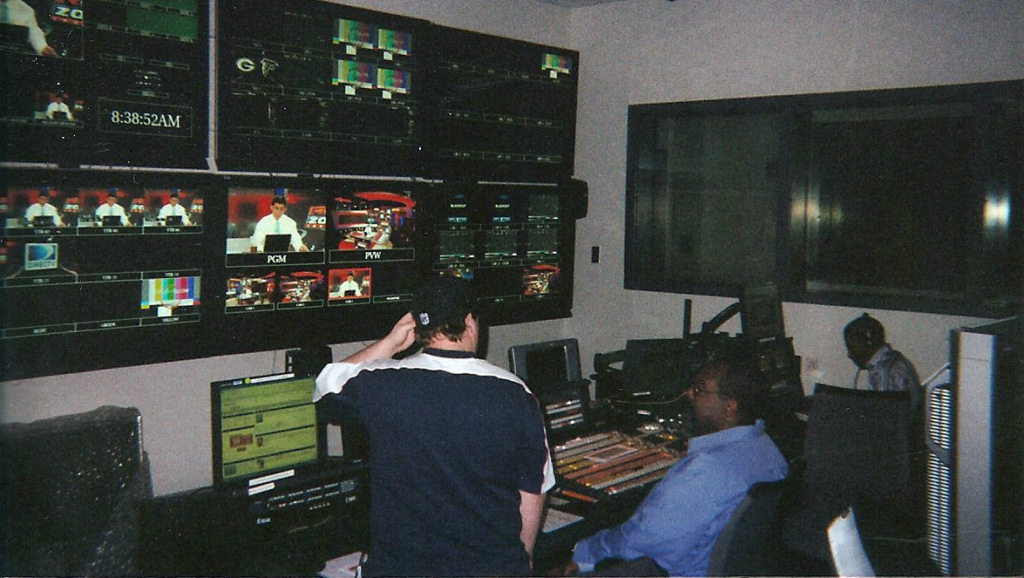
FOS: Kimani Morales, who was the producer on the Charger-Broncos broadcast, as you mentioned, said ‘It’s crazy how few Black producers and directors exist when the main sports that they cover have so many Black athletes and fans.’ What are your thoughts on that? Do your identities shape how you cover events?
JX: That could be a minefield in some ways, because it’s all about the event, right? It’s all about the event itself. That’s the story you’re telling right now. With that being said, are there times when, say, a person’s background can play a role in perception or how things are covered? I think that’s natural for all aspects of production, no matter what. Local, national, regional — whatever — everybody brings their life experience into their storytelling skills. It’s like the music, you choose, is it the flavor of the cut patterns? Is it something as simple as, say, when I work on a talk show — what I used to call the last bastion of true discrimination, when producers would actually move audience members around based upon how they look. It’s like, wait a minute, if a person’s coming to your show, because they’re a fan of the show, how can you say, ‘Ooh, let’s put more younger people up front, let’s move this here, I don’t like her wardrobe.’ Like really, that’s kind of odd, but it’s part of the industry, audience seating. Do you see the cutaways, and does my subconscious go ‘Ooh, that person’s a good looking person. Let me cut to that person. Oh, wait a minute. This person has given me lots of energy, but they maybe look a little different.’ Am I not going to take that shot? So that comes down to the whole sociological aspect of implicit bias, things of that nature. Or does your background and leave you open to see things differently?
I mean, Torrey, it’s like you as a woman writer, right? You want to be a great writer, no matter who you’re writing for. Back in the day, you would have to say, ‘Okay, I have to work for a newspaper A, B or C,’ but now with the technology today, you have so many more options to release your work, or you can release your work on your own, on your own brand based on what I call the digital universe, the internet, things of that nature. And then young women who are looking up to writers, they’re seeing your craft, not as a woman writer, but as a great writer who happens to be a woman. And then you inspire those people, you know? So your take would be different from say a traditional male take on a certain subject.
JC: My perspective on that is that sports is the ultimate reality television. Sports is unscripted. Reality television, for the most part, is not unscripted. So sports is the true reality television, and it’s unscripted. And as a producer, I go where the action takes me. And that’s what I’ve learned from the producing folks that I’ve worked with at Fox — go where the story takes you. To me, it’s not colored with black, white, red, or yellow.
JX: Now also let me emphasize, we are there working behind the scenes and we do have an impact as far as maybe sometimes not the decision-making process, which might be a higher pay grade than what I have, but I think we’ve all read those stories where it’s, ‘Oh my God, how did that get by?’
Something that might be culturally insensitive, something that might be, ‘Oh, that’s not a very good take.’ Did someone not tell you not to use that type of image? I was watching one of the shows on ESPN and they were playing memes. And in the background, for some reason, there was that one meme of the Miami heat player [Alonzo Mourning] sitting on the bench and he’s contemplating. They used the one where they had a bucket of Kentucky Fried Chicken in the image. And I was like, ‘Dude, how did that get by your producers? Did not one of your producers of color see that and stop you from putting that on air?’
Now, nobody made reference to it, but it’s little things like that. I knew they were trying to use that meme for the story, but they used one that had a composite image that wasn’t very wise to do, but it was really quick. It just went right by, but it caught my eye quickly. I was like, ‘Wow, that was a bad call on that one.’ So those are the things where you have things like your diversity of staff, your inclusion of staff, you know, how well-rounded your production team is, do you have representation? Did you have voices? It’s an important part.
But at the same time, I think there’s a lot of us out there that are working and doing things about participating, I did the Image Awards, and one of the recipients was Tyler Perry. And one thing he said that always stuck with me was, ‘Why wait for a project to be green-lit when you can own the intersection yourself?’ And I know that for a lot of people now with technology, the way it is now, the fact that on my MacBook Pro, and my Adobe creative suite, and my iPhone — which shoots 4K, is high speed — and then, my Garage Band and editing software, that anybody who’s a storyteller, anybody who’s a creative, has so many resources right now at their disposal to create content, to create, create, create. So no longer do I tell people, ‘You have to get a job at the studio and you have to do the job for this person right now.’ You have the power to do the storytelling, to work on your craft, to create, create, create, and put your work out there. So you may feel that your voice is being represented, or being covered correctly. You now have the power to tell your stories and express your truth at any platform that you can, without needing to be approved or allowed by, say, the bigger broadcast entities.
FOS: The seemingly obvious conclusion from it taking so long to have an NFL game have an African-American producer and director would be that there are barriers to entry in the industry for people of color. Can you kind of shed some light on if you did feel that there were barriers to entry for you in your careers?
JX: Part of my story is, and I hate to say it, but ignorance is bliss. For me, it was like, my parents, my grandparents, my elders, whose shoulders I stand upon, stress one thing: the world is yours. Anything I wanted to be and anything I wanted to do, I can make it happen. Was I ignorant towards things in the sixties and seventies and people that impeded my progress? I would have to possibly say ‘yes.’ Because it wasn’t til I was much older that I reflected about decisions that I made in the past, or things that were close to me, where I was like, ‘Huh, was it because of this? Or was it because of that?’ But I knew that I still kept moving forward because that’s what I wanted to do.
And that’s something else I’ve stressed to the youngbloods and people who ask me questions. If somebody is blocking you, impeding your progress, you go around them. You go through them, you go above them, you go below them, but whatever you do, you do not become stagnant. You do not stay in your place. You do not empower people to impede your progress and your growth because you have your dreams and ambitious things that you want to accomplish. You can either say, ‘Okay, it could be the race card.’ Or maybe that person is just an asshole. Either way, you cannot empower them to stop you from doing what you want to do. You’ve got to keep working through it. You’ve got to keep working through it. And I know that’s easy for me to say, because I’ve had much success in my life and my career, but I’ve got to stress how many times I didn’t let falling down, taking a step backwards, stop me from wanting to take another step forward to continue. And on the flipside of that, networking is everything. Building personal relationships, reaching out, doing your research, Googling the production companies, the TV shows, the thing that you like. Try to follow that email trail, try to find addresses, try to set meetings, try to work. But at the same time, start creating and working on your craft that you want to do, whatever goal that you might have. So it’s a combination of all these things. Never let those barriers become overwhelming, a monolith, something to stop you. Work through it. And then hopefully people who may be jerks because you’ll also find people who will be your mentors.
I know it sounds like a bunch of cliches, but it’s all true towards finding your journey. One more thing: enjoy the path, enjoy the process of getting from A to B or A to Z. Every stop along the way, every time you fall down, everything like that, remember it all. Chronicle that stuff in your life, because it’s all going to make you more of a fantastic producer, director, technician, whatever journey you want to have. And it will all make you a better person at the end.
JC: I don’t know if I can follow that. Agree 100% with Jonathan on the networking. My networking actually started — how I got my first job in the industry. Well, actually even my jobs outside the industry — were networking. I was a pharmaceutical representative for almost two years and I got that through a relationship in college, in a fraternity. Networking sometimes starts standing around a beer keg, drinking a beer when you’re 18 years old. The biggest networker that helped me out: my wife. We’ve been married for 24 years. She was in the movie industry. She’s working with a young lady in her production office, told her I was interested in sports, got me a phone number. She didn’t get me in the door, but got me a phone number. I called that phone number for about three months straight at Fox. Finally got in, spoke to this person. They handed me off to another person. I went in and met them. And I started as a day hire a week later. So perseverance, networking, understanding and trying to figure out — I tell my daughter all the time, ‘It’s just as important to figure out what you don’t want to do as what you want to do.’ Trial and error. My trial and error consisted of working retail, pharmaceutical sales. That was my error. That was my trial. I figured out that’s not what I wanted to do. I wanted to get into sports. To this day, from 1995 on, I haven’t regretted a day working in sports and working with the people I’ve been fortunate enough to work with. The path is not easy. Sometimes you feel slighted, but as Jonathan said, you can’t let those people dictate what your final level of success or destination is.
FOS: You took somewhat divergent career paths since working together on Red Zone — Jonathan staying freelance and James going the more corporate route. Did you make active decisions to take those paths, or did things just shake out that way?
JC: At Fox, it became studio versus road. And the road folks are a little bit more freelance types. I stayed in the studio, then became a full-time employee. I got married, had a child. The stability, once again, you know, ‘Life is what happens when you’re busy making plans.’ The stability of being in the corporation and the studio and that environment, is something I wanted and that I needed at that time. I just took a different route. Jonathan … he’s a risk taker and he’s a little bit different personality there. And like I said, he’s the king of networking and relationships. I keep going back to this, but I’m so happy for our relationship the last 25 years.
JX: Sometimes it’s like that one motivational post or something about how, ‘When we make plans, God laughs,’ or something like that. Sometimes you just adjust and roll with the opportunities that are presented. I mean, I haven’t had a regular full-time gig since 1987. That was the last time I had a staff job. The freelance world is good … you have to manage your personal life, your business life — you take risks and all that, but those are the doors I walk through and just try to maximize every opportunity.
